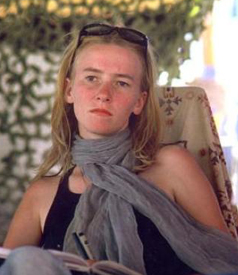On March 10, in the Israeli city of Haifa, American peace activist Rachel Corrie will get her day in court. Corrie’s parents, Cindy and Craig Corrie, are bringing suit against the Israeli defence ministry for Corrie’s killing by an Israeli military bulldozer in Gaza in March 2003.
Four key American and British witnesses who were present at the scene – members of the International Solidarity Movement – will be allowed into Israel to testify, despite having been barred previously by the Israeli authorities from entering the country. This reversal by the Israeli authorities is apparently due to US government pressure, The Guardian reported. (Three cheers for any US officials who contributed to this pressure. What else could you make the Israeli government do?)
A Palestinian doctor from Gaza, who treated Corrie after she was injured, has not been given permission by the Israeli authorities to leave Gaza to attend. (This would seem to be important testimony concerning the nature of Corrie’s injuries – did US officials exert pressure for his appearance?)
This case isn’t just about accountability for Corrie’s death. It’s a test case for the power of the rule of law in Israel, when the rule of law comes into conflict with the policies of military occupation.
When the rule of law in Israel comes into conflict with the policies of occupation, the rule of law often loses. But it does not always lose, particularly when the rule of law gets a boost from vigorous protest and political agitation. This month, Reuters reported Israel began rerouting part of its “West Bank barrier” near the village of Bilin – the site of many Palestinian, Israeli and international protests – in response to a petition filed in 2007 by Palestinians whose land was confiscated for the project. This was only a partial victory, because it only affected a minority of the confiscated land. But it shows that the rule of law in Israel is not totally impotent against the occupation, particularly when the rule of law is aided by protest and agitation.
It’s also a test case for the power of nonviolent resistance to the Israeli occupation. It’s commonplace among some poorly informed commenters – Edith Garwood of Amnesty International cited Bono, New York Times columnist Nicholas Kristof and President Obama as recent examples – that Palestinians should “find their Martin Luther King.” But this commentary is foolish and retrograde, as Rahm Emanuel might say. A necessary condition for the ascendance of a King- or Gandhi-type movement in Palestine is that if Palestinian nonviolence activists are killed by the Israeli occupation, the government of Israel pays a significant price for that killing. If the Israeli government can kill an American peace activist and pay little price, what chance do the Palestinian Kings and Gandhis have?
It’s instructive to do a press search on the recent developments in the Corrie case. Searching on Yahoo News, I found Israeli and Palestinian press, Jewish and Arab press, British and Australian press. But outside of The Seattle Weekly – Corrie is from Olympia, and Brian Baird is her representative – I found no general US press. Isn’t it remarkable that we Americans have to read the British press to find out about developments in the case of our compatriot? Isn’t this state of affairs something that Bono, Nicholas Kristof and President Obama ought to reflect on, especially given the fact that they have significant ability to do something about it?
The persistence of Corrie’s case as a thorn in the side of the Israeli occupation authorities recalls the 1960s Costa-Gavras docudrama “Z,” about the political fallout from the assassination by the US-supported Greek government of the Greek parliamentarian and peace movement leader Gregoris Lambrakis. There is a powerful scene in the movie in which one of Lambrakis’ associates visits Lambrakis’ widow to deliver the news that four high-ranking military police officers have been indicted in the killing. On the way to meet her, Lambrakis’ associate passes a group of Greek students painting the letter “Z” on the sidewalk, meaning “he (Lambrakis) lives.” Marveling at the students’ determined activism in the face of mounting repression, Lambrakis’ associate said, “It’s almost as if he were alive.”
They murdered her, and yet she dogs them. It’s almost as if she were alive.
Join us in defending the truth before it’s too late
The future of independent journalism is uncertain, and the consequences of losing it are too grave to ignore. To ensure Truthout remains safe, strong, and free, we need to raise $33,000 in the next 2 days. Every dollar raised goes directly toward the costs of producing news you can trust.
Please give what you can — because by supporting us with a tax-deductible donation, you’re not just preserving a source of news, you’re helping to safeguard what’s left of our democracy.
